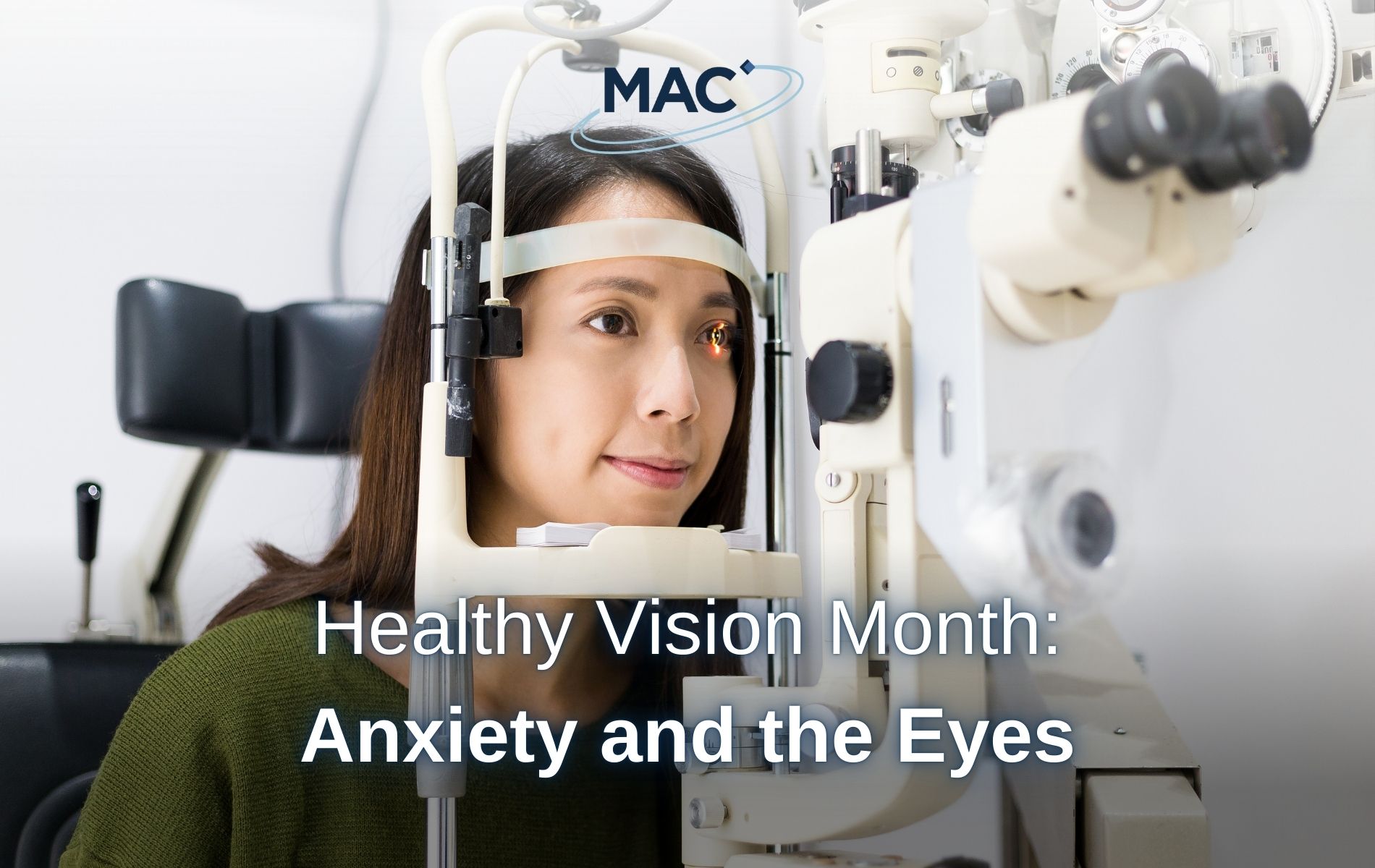May is Healthy Vision Month, and we’re exploring the relationship between anxiety and vision. Stress and anxiety can cause a range of mental and physical symptoms, including issues with the eyes. It can be both the result and cause of vision loss, making anxiety management and eye care crucial to visual health.
How does anxiety affect vision?
Anxiety is a natural response to when we feel worried, tense or afraid, particularly about things that might happen in the future. However, when feelings of anxiety impede your ability to live your life the way you want to, it can become a mental health problem1. If you find yourself facing persistent anxiety issues, you should speak to your GP to identify possible causes and receive support.
When we are anxious or stressed, our bodies respond to the perceived threat with an influx of hormones. These hormones, like adrenaline and cortisol, travel to targeted parts of the body to enhance its ability to deal with stress. The stress response affects the eyes by:
- Dilating the pupils to perceive more visual information
- Narrowing the field of vision to focus on the stressor
- Reducing the blink rate to minimise missed information
- Tensing and increasing blood flow to the eyes to maximise their reactivity2.
While these responses are helpful when facing a genuine threat, when the stress response is triggered by many different things or situations, the body does not get a chance to recover and rebuild its energy stores. This state is referred to as ‘stress-response hyperstimulation’. Chronic hyperstimulation stresses the body and can cause:
- Chronic eye muscle tension leading to eye movement problems
- Chronic muscle strain leading to twitching of the eyes, eyelids, and eye muscles
- Eye strain
- Persistent light sensitivity
- Persistent tunnel vision
- Blurred vision
- Visual abnormalities and irregularities
- Persistent dry eyes2.
Caring for your eyes with anxiety
Our eyes are a precious resource, and we must look after them. When living with anxiety, caring for your eyes requires a multi-faceted approach focused on:
1. Stress reduction
- Regular exercise can naturally help to reduce anxiety and improve blood flow to the eyes.
- Consider counselling or cognitive behavioural therapy (CBT) to learn anxiety and stress management techniques3.
- Practise relaxation techniques like deep breathing, mindfulness, meditation, and progressive muscle relaxation. This can help to lower overall stress levels and help manage anxiety symptoms as they happen.
2. Preventing eye strain
- Where possible, practise the ’20-20-20’ rule. Every 20 minutes, look at something 20 feet away for 20 seconds to allow the eyes to rest and take a break from focusing on close-up objects like screens.
- Take regular screen breaks and blink regularly, especially when working on sustained-focus tasks and using screens.
- Stay hydrated by drinking water regularly. Hydration is crucial for healthy tear production and dry eye prevention4.
3. Maintaining eye health
- Ensure you get enough quality sleep. Try aiming for seven to nine hours of rest in a quiet, dark environment with no screens or distractions4.
- Try to limit caffeine and sugar as they can aggravate anxiety and eye strain5.
- Visit your optician if you notice persistent eye problems or have concerns to rule out any underlying conditions.
Is your quality of life affected by social anxiety?
MAC Clinical Research is currently seeking volunteers who have symptoms of social anxiety and would like to take part in a new clinical trial to evaluate the effectiveness of an investigational medication with potential to treat symptoms of social anxiety disorder. You may receive up to £2,510 for taking part in this clinical trial. Reasonable travel expenses will be reimbursed for both the applicant and a companion to accompany them to the clinic visits.
To register your interest and find out more about this study, please visit our social anxiety study page.
References
1 Mind – Anxiety and panic attacks
2 Anxiety Centre – Eye problems vision anxiety Symptoms
3 Blue Fin Vision – Can Anxiety Affect Your Eyesight? Expert Explains
4 Accuvision – Connection Between Stress and Eye Health
5 Vision Specialists of Michigan – Causes & Connections Between Anxiety and Blurred Vision




